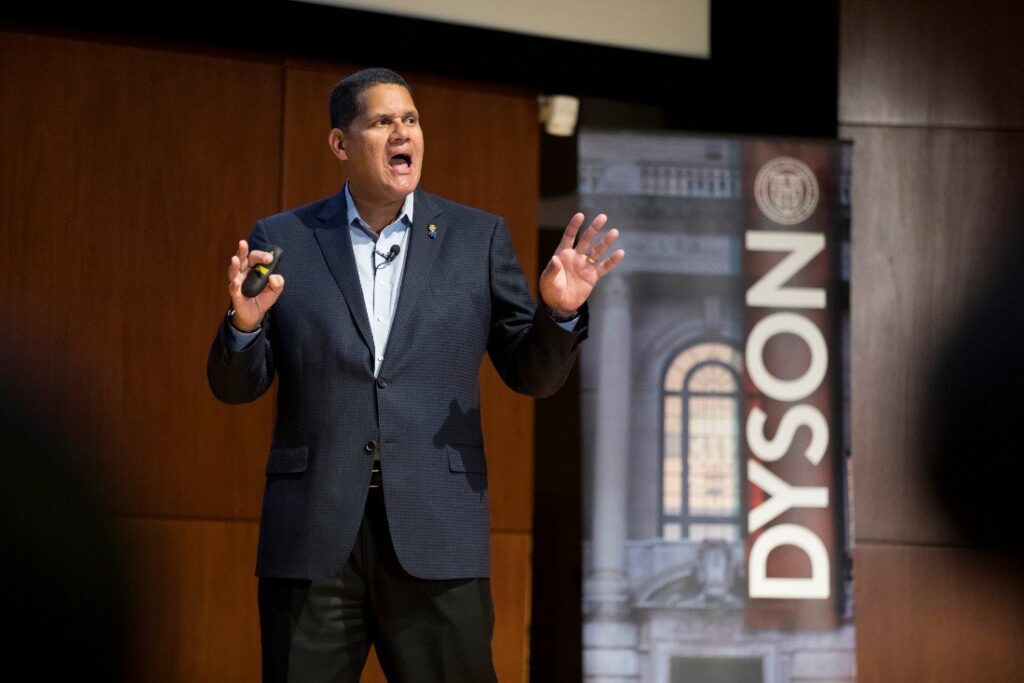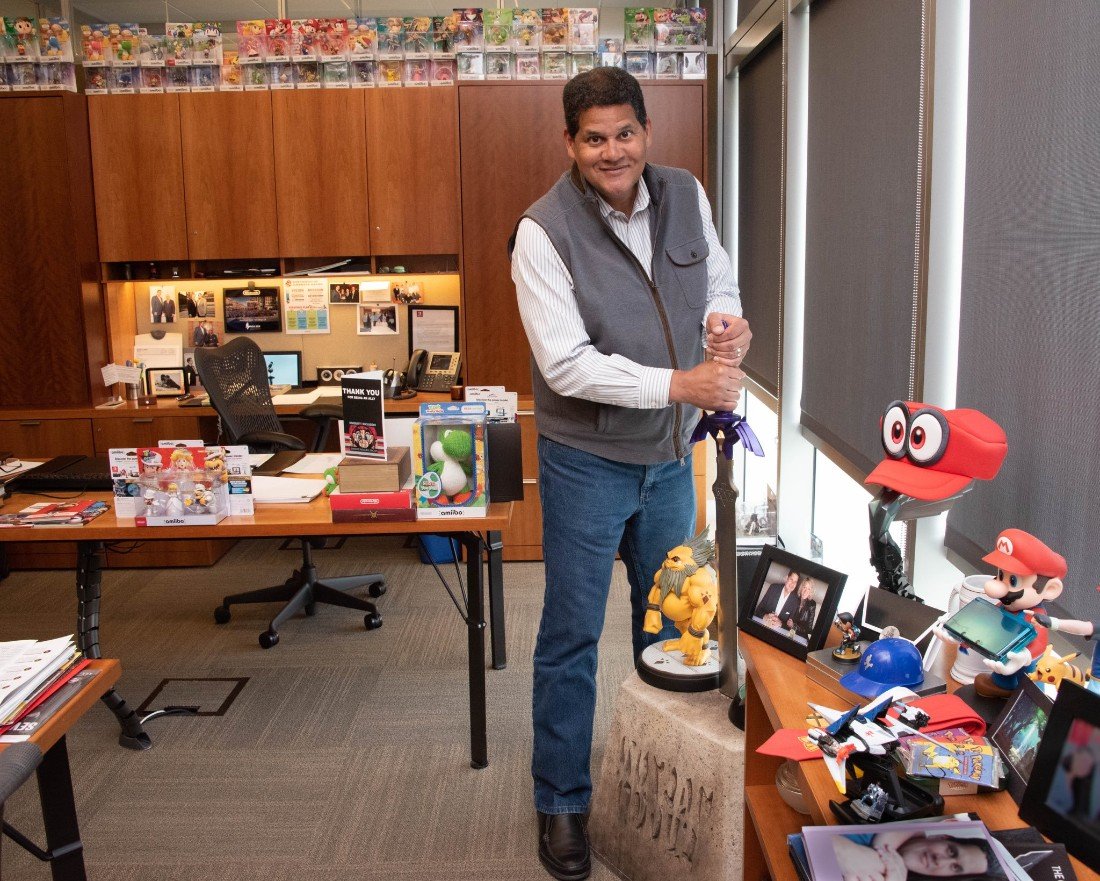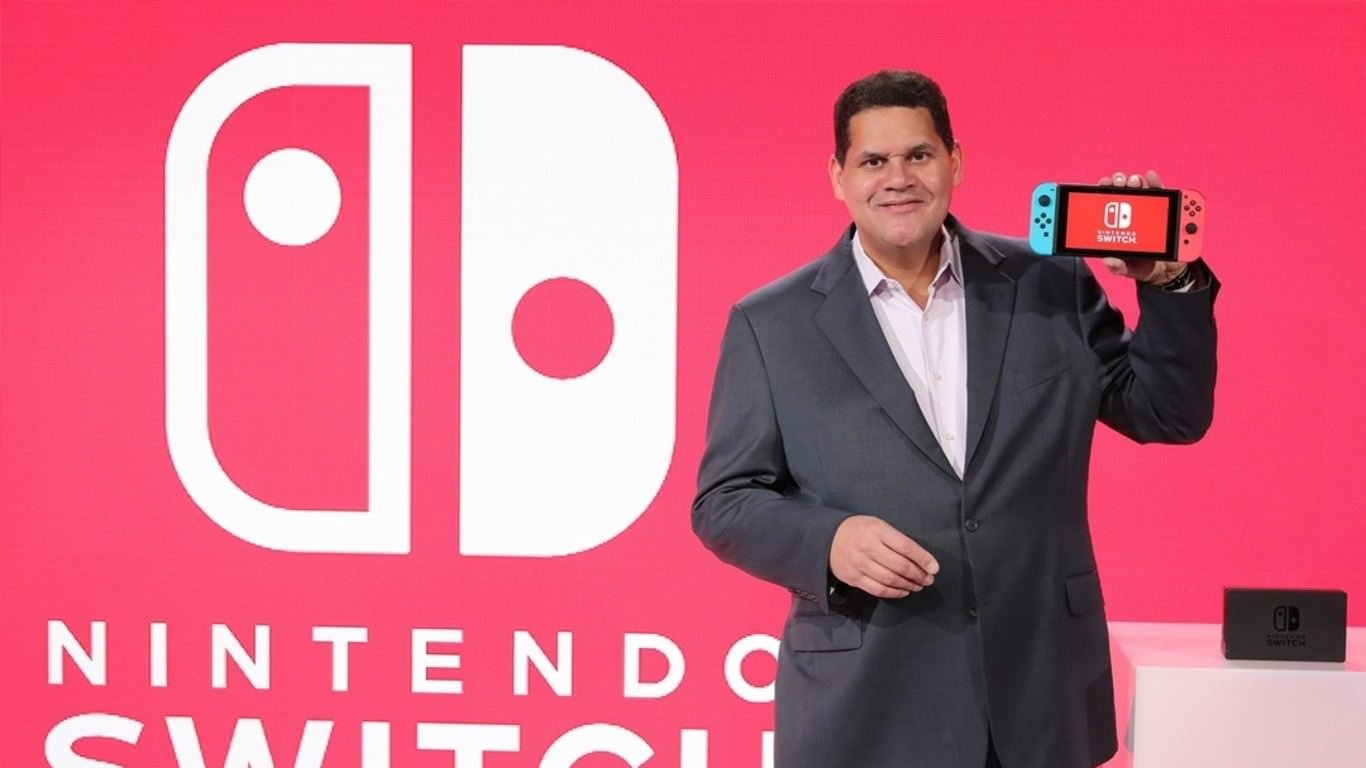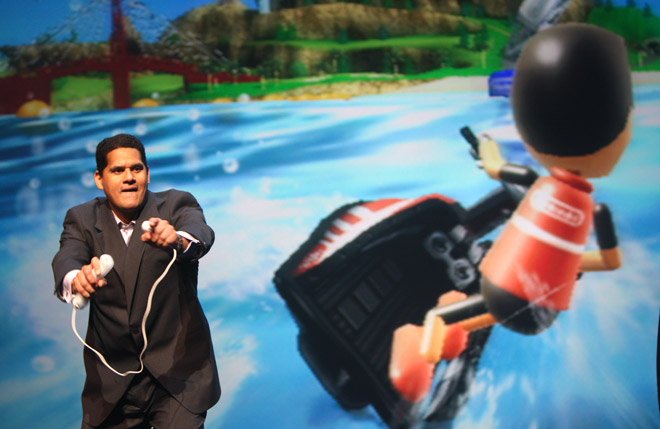
Nintendo of America would not be where it is today if not for Reggie Fils-Aime. The retired president joined at a time (in 2003) when the company needed to get its swagger back. The GameCube had been met with tepid reaction (and was mocked for its “lunchbox handle”), selling just 21 million units worldwide. With the launches of the Nintendo DS in 2004 and the Wii in 2006, Nintendo showed that it still can offer unique products that no other game company would even think of. And with Reggie taking over as president in 2006, Nintendo once again had a “cool” factor that had been missing.
Reggie’s marketing expertise and knowledge gained from his time at MTV Networks, Guinness, Pizza Hut, and more would allow Nintendo to tap into Western culture more effectively despite its Japanese roots. His rise through the ranks is no accident, as Reggie’s been formulating his Seven Principles for Next Generation Leaders for the past few decades. It’s these principles that guided him through both good and bad times during his Nintendo tenure. Reggie’s infamous “taking names” introduction to Nintendo fans instantly put him in the spotlight, but his legacy may be about making names, as the veteran executive wants nothing more than to share his business learnings and help shape the next generation of leaders.
Joining his alma mater, Cornell University, as Dyson’s first Leader in Residence, was a no brainer for the veteran executive. In an exclusive interview with GameDaily, Fils-Aime explained that he had already been on the Dyson Advisory Council for a number of years and the advisory council for the communications department at Cornell University.
“Iit was a classic situation of the opportunity being present and me being ready to take advantage of that opportunity,” he said. “This leader in residence program is brand-new. Ironically, I was having conversations with Cornell leaders in April, right after the [retirement] announcement. And they shared that they had this program that we’re working on, that it was something they wanted to implement in this upcoming academic year and [asked] if I would be interested. And clearly I had the time to devote to this project.”
Fils-Aime continued, “So in retirement, I’m going to be focusing on two key passion points. First, building the next generation of leaders, and second, helping companies build enduring cultures. Building next generation leaders, that fits in with the activity I’m doing at Cornell as their inaugural leader in residence. And it fits with the activity of the New York Video Game Critics Circle and their community outreach I saw firsthand when I visited Dreamyard Academy [in the Bronx] right about this time last year. The work that’s done through the power of video games, using video games as the medium to teach critical thinking, to teach writing skills [is inspiring]. And for me, having grown up in the area of the Dreamyard School, this presented a great way for me to engage, and to use this as another plank in my work to build the next generation leaders. So it’s Cornell, it’s the New York Video Game Critic Circle and joining their board, it’s the speeches that I’ve done and will be doing, the South by Southwest speech in March. [These are all] a key part for me to engage in building these next generation leaders.”
Not only is Reggie now on the board of the New York Video Game Critics Circle, but he’s receiving their Legend Award. On top of that, he was honored with a Lifetime Achievement Award by the International Video Game Hall of Fame. The outpouring of love and support, even now in retirement, has floored Reggie, and it’s certainly made him reflect on everything he’s accomplished in his long career.
“The reaction to [my retirement] video, the fact that across a variety of different platforms – last time I checked, it’s been viewed over 10 million times – that right there framed the community reaction, the passion, which I have to say was not expected [and] certainly gratifying. As we’ve continued and as I launched my @Reggie Twitter, seeing the reaction there, the feedback to posts and just how the community wants to hear from me, has also been tremendously gratifying. These awards, again, [were] completely unexpected. As I joke with friends, I tell them that I thought you had to be dead before you were recognized,” he remarked.

The praise and adoration of fans led Reggie to think back to what kind of legacy he’d be leaving at a company that has meant so much to gamers everywhere. “It has caused me to pause and reflect and certainly be appreciative. That said, especially toward the end of my time at Nintendo, my focus was clear in creating a legacy,” he said. “And what I mean by creating a legacy, it means making sure that the business was well positioned to be successful, without me as a part of it. And for the organization to be successful without me as a part of it.
“And it was driven home, actually as I joined Nintendo, tail end of the GameCube years, at Nintendo America there’d been a fair amount of senior executive transition. And I felt how the organization wanted a sense of purpose and a sense of continuity. And I think that’s why I was welcomed so readily and was able to make an impact so quickly. So having had that experience 15 years ago, I wanted to make sure that the legacy was set. And so, I was fortunate to be able to do that.”
Reggie explained that he started genuinely thinking about retirement and his Nintendo legacy not long after the untimely passing of Nintendo’s global president Satoru Iwata in 2015. Iwata’s impact on Nintendo, on Reggie, and the entire game industry cannot be overstated. Only four years after his death, the wound still feels a little raw.
“In terms of really thinking about legacy at Nintendo, it became crystal clear to me with the passing of my dear friend Satoru Iwata,” Reggie affirmed, his voice cracking slightly with emotion. “It just reinforces how fleeting our existence is. It also reinforced for me the legacy that he had built, and he had created for the company. And that really drove me to be introspective around, ‘So what’s the legacy that I want to build, that I want to leave? So I would say that event certainly crystallized for me the importance and motivated me to be clear and intentional in what I wanted to do. In terms of the timing, again, the business needed to be healthy and set for positive performance and the organization needed to be ready, and those two came together earlier this year. So, that’s what drove the timing [for my retirement].”
When it comes to business leaders, Reggie said that he considers Iwata one of his mentors, and someone that he learned invaluable lessons from.
“I learned so much from, Mr. Iwata and I’ll share a story,” he reminisced. “When I was being recruited for the opportunity to join Nintendo, I asked as part of the process to speak with Mr. Iwata. It was not going to be part of the process and as I learned later, it actually was a bit of a disruption in the process. Imagine from Nintendo’s perspective, ‘Who’s this candidate thinking that he can spend time with our global president. This is not a role that is going to be based in Japan. Why does he want to talk with him?’ I mean, you can imagine the types of conversations that must have been happening. But in the end they agreed for me to speak with Mr. Iwata before I would decide whether to accept the role.
“It was set up to be a half-hour conversation and it ended up running much longer than that. And it really sets the stage for the type of business and personal relationship we would have. We would talk all the time. He was gracious in sharing his perspective. He was tremendously accommodating in hearing a unique point of view from me, a person who had no history in the video game business other than as a player. But [he valued] my perspective because I brought a consumer sensibility. I brought a Western business sensibility. And the relationship that he and I had for almost 11 years, it was truly special and just, his openness with me and the things that we were able to do truly together, were just magical.”
At the end of October, following his first Cornell Dyson lecture, Reggie shared an overview with video clips of his seven business principles on Twitter. While all seven have been a key to his career and Nintendo’s success, there are a few in particular that stood out from the rest, especially as they relate to events at Nintendo. Intellectual curiosity is perhaps one of the most vital ones for Nintendo’s management.
“I would absolutely agree that intellectual curiosity is a key tenet with the leadership at Nintendo,” Reggie affirmed. He said that both Iwata and Mario creator Shigeru Miyamoto constantly exhibited intellectual curiosity that drove Nintendo’s vision. “[They wanted] to understand why a person feels the way they do, why you react a particular way, why you believe what you believe,” he noted.

“… with the Wii, it’s tough for people to remember, but back in the early 2000s, only about one out of every three people played video games. Also back then, the industry was stagnant and in key markets like Europe and Japan, software sales were actually in decline,” Reggie continued. “And you know, clearly the company thought deeply about this. And to be clear, the thinking happened before I joined the company. The company saw the stagnation of the industry as a result of too much complexity, too many sequels. [They saw] the same general game, but now it’s version five or six, the lack of innovation and the lack of fun.
“That was their diagnosis. Competing companies saw the answer in more horsepower and more accurate visual representation. And you can clearly see the divergence in the Nintendo DS, for example, versus the PlayStation Portable. You can see divergence and strategy in the Wii, versus what Sony and Microsoft executed in their machines. And so absolutely, intellectual curiosity, asking tough questions to get at the heart of a business problem and proposing solutions that are based on what the issues are versus what your belief set is, is clearly something that the company has done well.”
Stellar communication was another critical business principle put to use at Nintendo. And because of the language barrier between Japanese and Amercan executives, nonverbal communication took on a greater importance as well.
“The typical process when working with our parent company was sequential translation. So a person speaks in Japanese with animation and smiles and hand gestures that then gets translated to English with none of that. I respond in English with hand gestures and emotion, and then that gets translated with none of it back into Japanese. And so you really have to be a master in picking up nonverbal cues and how that supports the key communication that needs to be done,” Reggie explained.
This sort of back-and-forth could make some anxious. For Reggie, however, it was more informative. He also went out of his way to get educated on Japanese culture and Japanese business practices, which can vary wildly from those in the West.
“I absolutely immersed myself in Japanese culture, especially the culture and history of Kyoto and the broader Osaka region. Kyoto was very different than Tokyo and the business culture at Nintendo was unlike anything I’d ever experienced,” he noted. “And Nintendo employees themselves would say that the approach is not like any other Japanese company. It is truly unique. And I made it a point to learn as much as I could about Kyoto culture [and] Japanese culture. When I would visit Kyoto, and I visited quite frequently, I made it a point to spend time with key executives, to enjoy the culture, and to use it as a way for me to better work with my peers and contemporaries at the company.
“I’ve [also] learned the value of silence and letting someone truly think and consider a point that I’ve made. Westerners love to fill in conversation. They often don’t let the other person think. I learned the power of silence and letting people think, versus just continuing to try and push a particular point of view.”
Courage in decision making is another business principle that’s been instilled in Reggie at the various companies he’s worked for. At Nintendo in particular, that courage is evident in the design decisions the company has made, whether that’s leveraging dual screens in the DS, motion controllers and lower graphical fidelity in the Wii, or having the fortitude to bounce back from the poorly received Wii U and pushing its vision for a hybrid device in the Switch.
“Courage in decision making is a key leadership function, meaning if a decision comes to a leader, typically because it’s high financial magnitude, high potential risk, and you have to take courage in making that tough call. And, Mr. Iwata made this comment, ‘Nintendo is a company that runs toward risk.’ It always has from its origin in 1889 to the business today, and making tough decisions, making them based on the strengths of a company, the values of the organization, it is a key leadership skill. And I was fortunate to work alongside leaders, not only at Nintendo, but at my other business experiences that really believed in making tough business decisions,” Reggie commented.
Games (and technology in general) is not a very diverse field. Women and minorities in positions of leadership are sadly the exception, and not the norm. The game industry has started taking more steps in the right direction, to be more inclusive, and that’s been helped by high-profile figures like Xbox boss Phil Spencer not only espousing a message of gaming for everyone, but actually walking the walk.
Nintendo in many ways was ahead of its time. Not only did it appoint Reggie — a black man from a Haitian family — to the highest position in America, but it also hired two women, Perrin Kaplan and Beth Llewelyn, for executive marketing roles. Valuing differences is another crucial principle for any business to adhere to. Reggie lamented that all too often people in positions of power merely pay lip service to diversity and inclusion, but don’t take real action to address it.
The New York Video Game Critics circle stresses inclusivity by seeking to help underserved communities with scholarships and mentorship opportunities. It’s a key reason why Reggie joined their board.
“Valuing differences and having that as a core leadership principle is critical. And I believe in order for organizations to make progress on diversity and inclusion, it has to start at the top and it has to be led from the top,” he said. “And so as you look across the broad video game industry, as an example, I would argue that organizations that made progress in this space [did so] because the leaders believe it and they drive it and they reward it. And organizations that don’t make progress in this area, it’s because candidly, they don’t value it.”
As Reggie looks to help shape the new generation of business leaders through lectures, consulting, and serving in non-executive positions at various organizations, he’s going to do all he can to make sure that leaders come from diverse backgrounds and that they carefully consider how to value differences across the board.
“Every leader needs to look at themselves and say, ‘Is this something that’s important, and something I want to stand for, and something I want to drive or not?’ And I won’t [lie], it [was] hard work for me in my role at Nintendo as well as leadership roles in other companies. In order to push this forward, it is hard, hard work. And so the leader needs to believe it and drive it. And where organizations do that, they’re able to make tremendous progress,” he added.
Reggie is, and always will be, an ambassador for the game industry. Out of respect for his former company, he said he didn’t want to prognosticate about the biggest trends to impact the business now, but noted, “I’ve got a lot of thoughts around gaming and entertainment technology.” These thoughts and his seven business principles should serve him well in his endeavors to cultivate the next generation of leaders. It’s why he launched Brentwood Growth Partners.
“Brentwood Growth Partners is a key part of how I am looking to build enduring cultures. So, that is the entity where I’ll do some angel investing. It is the entity by which I’ll do consulting. It is the entity that will house my non-executive director positions with outside corporate boards. So, it is the second pillar of my strategy in building enduring companies and enduring cultures, and leveraging my knowledge and experience to do that,” Reggie explained.

As you might have guessed based on his return to Cornell, Reggie is a big believer in education. Part of shaping the next generation of leaders means ensuring that today’s youth can gain the knowledge they need to enter any given field and become a leader. With that in mind, Reggie is looking to help tackle the problem in his current state of Washington.
“In addition to being an ambassador for the gaming industry, in addition to the broader work in the entertainment and technology space, there is another area where I’m investing a lot of my personal time and it’s in the broad space of education,” he said. “So K through 12 education, secondary education, certificate programs. Where this passion comes from is that I’ve been fortunate to work with an organization here in Washington state, and spend [time on] a lot of analytical work about jobs in the state. And as a result of the current state of at least Washington, there’s going to be almost 750,000 jobs over the next 10 years that are going to go unfilled based on the current output of the educational system here in Washington state.
“And it really makes you, as an analytical person, dig deep to understand where the issues [stem from], and what needs to change in order to fill these jobs. And these are nurses, and technicians, and skilled workers, building airplanes for Boeing. These are, yes, Nintendo, Microsoft, [and] Amazon employees. And this is a huge issue, not only in the state of Washington, but arguably across the entire U.S. So this is another area that I am investing personal time to help shape approaches, help shape thinking, to try and drive some positive solutions.”
At age 58, and having accomplished so much in his career, Reggie is happy to spend time advising and giving back. He said he has no interest in running another major game company or any large corporation now.
“I was fortunate that right after my retirement, a company outside of the gaming space contacted me to run a large part of the company,” he said. “This is a 10 plus billion dollar business… the growth vehicle for this company. And it forced me early on to think deeply [about] whether I wanted to be back in a 24/7 role, hands-on, running something versus being more in this advisory and consulting role. It’s firmly reinforced for me that I want to be in the advisory and consulting role versus running another business. If I wanted to continue running a business, I would have done that.”
Oftentimes, business leaders will point to legends like Steve Jobs, Bill Gates, Warren Buffet and others as inspirations for what they’ve achieved. For Reggie, though, it’s more about the people he’s been surrounded by, including his “critical mentor,” Satoru Iwata.
“I was fortunate that the inspirations and knowledge came much closer than a figure like Steve Jobs who I didn’t know and never met, or others that I didn’t know or never really spent quality time with. I’m very fortunate in that way. And I believe that the knowledge, the skills, the insights, the fortitude that I received from these close-in mentorships were just so much more critically valuable to me,” he remarked.
“In the world of advertising, I was exposed to David Ogilvy and his principles for effective advertising. While at Proctor and Gamble I was exposed to Stephen Covey and his principles. So early on, I gravitated toward this idea of having clear and articulated principles, because they help you in your actions. They make it clear for you how you need to behave and proceed when facing challenging times or challenging decisions,” Reggie added.
Having left an indelible mark on Nintendo, Reggie hopes to do the same on a much broader scale with young, inquisitive minds. As the saying goes, teach a person to fish and you feed them for a lifetime.
 GameDaily.biz © 2025 | All Rights Reserved.
GameDaily.biz © 2025 | All Rights Reserved.